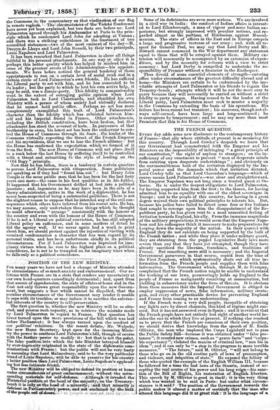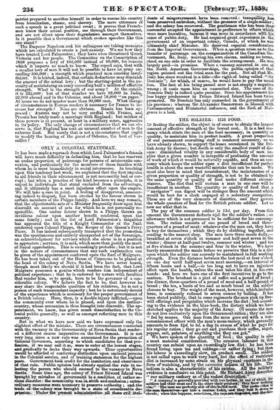THE FRENCH QUESTION.
EVERY day adds Same new disclosure to the contemporary history ef France—that ally whose attitude at present is so menacing for this country. Through Lord Cowley's despatch we learn that our Government had remonstrated with the Emperor and his Ministers on the impossibility of infringing- "a great principle of our collatittition," the right of asylum to strangers ; on the in- sufficiencyof any enactment to prevent "men of desperate minds from entering -upon desperate -undertakings " ; and obviously on the unreasonableness both of the irritation displayed by the Im- perial power and the demands which that irritation dictated. Lord Cawley tells us that Lord Clarendon's language—which of course means Lord. Palmerston's—was clear and straightforward. The Emperor Napoleon was not long since a trusted guest at Os- borne. lie is under the deepest obligations to Lord Palmerston, for having supported him from the first ; to the. Queen, for having admitted him to an equality with ene of the oldest sovereigns in Europe ; and to the people of this country, for having in a great degree waived their own political principles to tolerate his. But, because his police have failed to detect some four or five Italians that sought to revenge . upon him the disappointment of the Re- publican party, he has given vent to a most unmerited feeling of- irritation towards England, his ally. From the immense magnitude of the military preparations it would seem that the Emperor Napo- leon and. his colleagues think it necessary to make preparations for eeping down the majority of the, nation. In their quarrel with, England they do not calculate on being supported by the bulk of the French nation ; and while they place it under military guard, they are obtaining from the puppet Legislative Body laws more- severe than any that they have yet attempted, though they have already -sacrificed the liberties, franchises, and traditions of France. But something more still is necessary ; and the Imperial Government. Perseveres in that course, copied from the time of the First Napoleon, which systematically shuts out all true in- formation from the French , people and supplies them with false inform afion . The Government which, through M. de Persigny, coniplained that the French nation might be unable to understand the working of our laws, perseveringly holds up England to the people of France as malignantly conniving at assassination, but yielding in subserviency under the force of threats. It is obvious from these measures that the Imperial Government is obliged to employ suppression of news,. false information, Military strata- gem' and every other practicable device for preventing England.. and France from coming to an understanding.
If the French-were a -very dull people, incapable of obtaining any lights save by direct channels, this kind, of regime might suc- ceed. But it has not answered even in Spain ; and it is evident that the French people have not entirely lost sight of another world be- sides the one in which they live at present. if nothing else reached us to prove that the French are conscious of their own position, we should derive that knowledge from the speech of M. Emile 011ivier, the man who implored the Corps Legislatif not to pass the Public Safety Bill—because it was obtained under "false pre- tences "; it created new orimes, such as "grave facts" and "culpa- ble expectancy"; violated the maxim of criminal law, "non his in idem"; and it can only be " a step in the progress to more terrible measures." "The future," said M. 011ivier, "will not belong to those who go on in the old routine path of laws a presumption, and violence, and iniquities of state." He exposed the fallacy of those who quoted the example of the English William III, because he followed for a time the bad laws of the Stuarts, . instead of ac- cepting the real source of his laower and his long reign—his sanc- tion of the Bill of Rights,: his restoration of English liberties. This speech by M. 011ivier is good in itself; it is the very thing which was Wanted to be said. in Paris: but under whit circum- stances is it said ? The position of the Government towards the public makes it almost a matter of certainty that the man who tittered this language did it at great risk : it is the language of se
patriot prepared to sacrifice himself in order to resone his country from humiliation, shame, and slavery. The mere utterance of such a speech is a great political event ; it proves that French- men know their actual position, see through their Government, and are not silent. upoa their degradation amongst themselves. Is it possible that a Government which evokes speeches like this esui stand ?
- The Emperor Napoleon and his oolleag.ues are taking mea.surss which are calculated to create a juitinxiety. We see how they have treated Lord Palmerston; they have even threatened Queen Victoria and her people. The Committee on the Conscription of 1858 proposes a levy of 10(1,000 instead of 80,000, for reasons which it imports us much to know. 'The -report says, that with a smaller 1 of men it-will not hernia-Isle to have an runny es- eeeding 500,000 a a strength which practical men consider insuf- ficient. It is hinted, indeed, that certain deductions may diminish the amount of the actial levy ; bitt the starting-goint is the ste- meaty ofanaintaining an army exteeding half a million of effeetive strength. What is the strength of our army? At the outaide it is 222;00g; but of that number we have 92,000 in India, 4;000 abroad and.in the Colonies, and about 78,000 "on paper." At laoraewe do not imuster more than 30,000 men. What chauge, of -circumstances in Europe renders it necessary for France to m- crease her Austria maFfiNneonte arbee vobvious. diaiRuzitha hrurenee,been and. very COT sessia:bas latelarme e a marriage with England; but neither of these powers is at present, at least in. a nattary, tense' aggressive in its policy. The only change of circumstances that we can ob- serve is, that England has sent an unusual number, of men to the extreme Bata. But surely that is not n circumstance that ought to' raoclifY the bearing of the guest of Oshor.ne, the host of Vcr- snillei? '



























 Previous page
Previous page